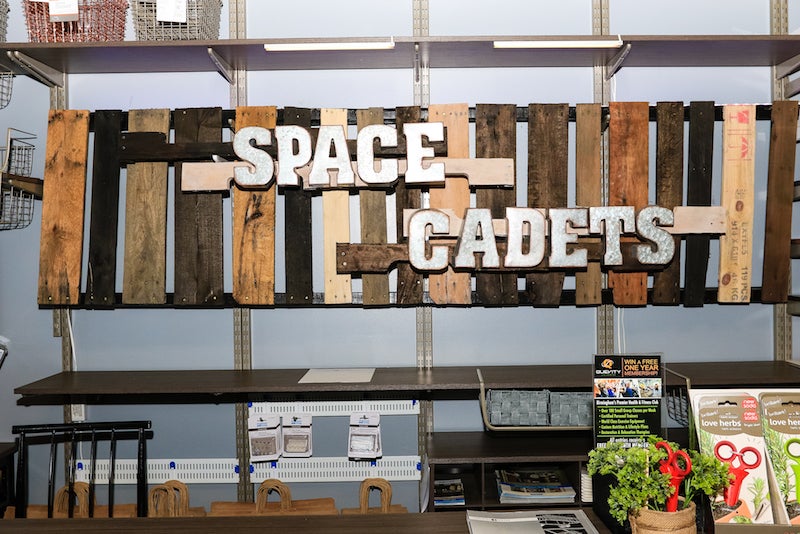Kim McBrayer is honest about her past struggles with organization.
“I was a very messy person. I just felt like I was a terrible failure at all that, and I was the only one with that problem.”
Kim, 47, remembers waiting in the car line at her son’s school, looking at the other moms balancing their checkbooks or arriving from the gym to pick up their children, and thinking, “What’s wrong with me? Why can’t I do this?”
“I just felt like this big fumbling mess,” she says. “I saw my son struggling because of it, and it impacting him.”

Kim’s feelings of inadequacy and shame came to a head one day when she sent Carson to school in a tie-dyed shirt instead of the green shirt he was supposed to wear for a field trip.
“I looked at him and thought, ‘What kind of mother am I?’ I felt like I was failing my son. It bothered him. It was a turning point for me that I’ve got to do something better.”
Kim started to read books about how to be organized. The Messies Manual by Sandra Felton was transformative. Sandra’s explanations helped Kim understand what she needed to do to overcome her challenges, starting with keeping her house clean.
“I did everything she said. “I broke apart my house, analyzed everything, developed a lot of systems that work and I began sharing those with other people. They worked for them, too. It’s really about behavior modification for me.
“My husband started telling people, ‘Kim’s been organizing our house.’ They would ask me about it, and I began to realize I’m not the only one that suffers from this. I started taking off my mask and being real with people. Maybe I could help other people with my own struggles.”

The years leading up to Kim’s turning point were filled with emotional highs and lows that ultimately were connected to her difficulties with organization. She got married between her junior and senior years at the University of Alabama. She and her then-husband moved to Birmingham and had two children, Carson and Cassidy. Kim says she supported him in his career and taught piano lessons on the side of her duties as a stay-at-home mom.
“As much as I enjoyed it, staying home is not what I planned to do forever,” she says. She had majored in advertising and marketing at UA and knew she would own a business someday. Once her husband was established in his career, Kim felt it was her turn to pursue her goals. In 2001, she opened an organization business in Pelham called All Spaced Out. It was a new industry concept in Alabama, and Kim saw it take hold quickly. She collaborated with others to develop one of the first organizing firms in the country.
“We expanded and began offering closet design and installation as a component,” she says. “At that point, we went big. I had a full staff. We were running multiple teams on jobs. It blew my mind how quickly it grew.”

Then, a “crazy season of life” unfolded. Almost as quickly as the business had flourished, its foundation began to crumble, and Kim had to close. Around the same time, she and her husband divorced, and her 17-year-old son was diagnosed with bone cancer.
“He battled one week shy of a year,” Kim says of Carson, who had stage 4 osteosarcoma. “It had spread. We just began to look at treasuring every moment and trying to pursue pain relief.” Carson died in 2011.
As she processed her grief, Kim wrestled with whether she wanted to get back to the business. She had shut down All Spaced Out, but she still helped clients who called on her. She went into isolation to “deal with myself and find God and make sense of it all.”
Kim’s daughter, Cassidy, was a light in the darkness after Carson’s death. “She is my smiley face on the darkest of days. She can brighten any room,” Kim says of Cassidy, now 13 years old. Another bright spot in Kim’s life was reuniting with and marrying Brett, her high school sweetheart.

“I felt like there was this incredible sadness in my life, and then I was blessed with some happiness,” she says. “After that season, I realized (the organization business) is my passion, and I couldn’t imagine my life without it.”
In 2013, Kim launched Space Cadets. “I just played with it for a little while. In 2016, I decided this is really what I want to do, so I began pursuing it eagerly and aggressively to regrow the business.”
She operated from a space in Birmingham’s Pepper Place district, but Inverness’s retail area off Valleydale Road, near U.S. 280, was closer to home. “I drive by this place every day, and it just kept calling my name. It’s right here in my community.”
Space Cadets’ grand opening at 5291 Valleydale Road took place on Dec. 5, 2017. Having a retail shop allows Kim to have a showroom and space for client meetings, and to sell organizational components to clients who want to handle a project themselves.

Helping people pinpoint what’s causing their disorganization, and then working through it to reverse it and put a permanent system in place, is at the core of Kim’s mission. In the years since she first read The Messies Manual and started sharing her personal success with other people, Kim has realized how many people—even those who are hesitant to admit it—experience some degree of difficulty with organization as emotional issues manifest themselves in physical clutter and disarray at home. “As I was authentic with people and shared my struggles, people were looking for that, too. Life is really, really messy, and we all deal with obstacles we have to overcome. It takes a toll on our homes.”
According to Kim’s research, the top five stressors in life are divorce, death of a loved one, moving, job changes and health issues. As a result, disorganization and clutter happen. Kim describes these events as train wrecks that halt forward progress and throw people off their tracks. “I never anticipated in 2010 I would have a train wreck of massive proportions. All five of those (stressors) hit me in one year, and my life fell apart. It gave me new appreciation for my clients. My job is to come in as the cleanup crew would and pick up the cars, put them back on the tracks, turn the power back over to them and they can start chugging along again. To me, it’s about getting people back on track.”
That’s what Kim did in her own life. It took awhile, she admits, but she is back on track now and moving forward again. On the other side of her train wreck, she can better relate to what her clients are going through and help them restore order. And for Kim, her faith also strengthened.
“I’ve got a completely different perspective,” she says. “I survived by the grace of God. Through that process of losing my son and marriage and business and home and community and health, all of that brought me closer to God. There was beauty in the brokenness. It’s brought a new awareness that’s made me better at what I do – purpose in the pain.”
Kim keeps her colleague Barbara Hemphill’s summation of disorganization close for reference: “Clutter is nothing more than procrastinated decisions.”

Another quote that guides her is from Tony Robbins: “Change happens when the pain of staying the same is greater than the pain of change.”
“I look at that process of making decisions,” Kim says. “If something attaches emotionally for us, we don’t want to deal with it.”
Enter Kim and her Space Cadets crew. They try to make the process more efficient and enjoyable for clients by handling all the physical labor so people can focus on the mental part of the decision-making. What might be a three-month process may only take three days.
“We have such a great team. I’m blessed by amazing ‘Cadets’ that make this a beautiful process. Our clients become friends. They’re honoring us with their trust, with spaces of their home they would typically close off. We hold that in high regard and confidentiality.”
Space Cadets can work with clients during new construction, remodeling or moving, as remotely or as hands-on as a client prefers. Kim emphasizes her judgment-free approach to all of her clients’ situations with the paradox of someone tidying up before their housekeeper arrives to clean their home. “I’m going to show up looking for someone who needs help. I’m a recovering messy as well. That’s my passion: to help them overcome that shame, step out of the isolation and set them free from the bondage of clutter.”
Kim is planning to do more speaking engagements to share her message in hopes of inspiring others. She wants people to know they’re not alone or without resolution.
“We all live with clutter at some level. When it becomes so painful of staying that way, that’s when we look around and say, ‘What can I do differently?’ That’s when they call us. Help is available. You don’t have to live like this.”










